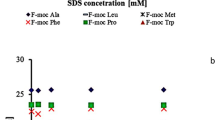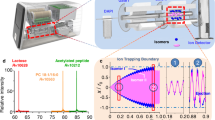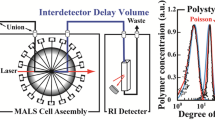Abstract
MOST of the methods at present used for separation of inorganic ions by column chromatography are either based on cation and anion exchange or on partitition chromatographic procedures using cellulose, silica gel, ‘Kel-F’ and various other inert materials as supports for a stationary phase, mostly an aqueous solution, or, as with the reversed-phase techniques, with an organic phase which either acts as an extractant or as a cation or anion exchanger. Common to these methods is the fact that only one mechanism (either ion exchange or solvent extraction) is the decisive factor for effecting the separation. This is especially so in relatively strong mineral acid solutions. Seen from this point of view, these separation techniques are in practically all cases only one-dimensional, that is to say, only one of these principles can be utilized.
This is a preview of subscription content, access via your institution
Access options
Subscribe to this journal
Receive 51 print issues and online access
$199.00 per year
only $3.90 per issue
Buy this article
- Purchase on Springer Link
- Instant access to full article PDF
Prices may be subject to local taxes which are calculated during checkout
Similar content being viewed by others
Author information
Authors and Affiliations
Rights and permissions
About this article
Cite this article
KORKISCH, J. Combined Ion Exchange-Solvent Extraction: a New Dimension in Inorganic Separation Chemistry. Nature 210, 626–627 (1966). https://doi.org/10.1038/210626b0
Issue Date:
DOI: https://doi.org/10.1038/210626b0
This article is cited by
-
The transport of metal ions through fiber supported solid membranes in mixed solvents
Fibers and Polymers (2011)
-
Ion exchange of uranium(IV) in hydrochloric acid—Organic solvent mixed media
Journal of Radioanalytical and Nuclear Chemistry Articles (1990)
-
Rapid ion-exchange separations of actinides
Journal of Radioanalytical and Nuclear Chemistry Articles (1988)
Comments
By submitting a comment you agree to abide by our Terms and Community Guidelines. If you find something abusive or that does not comply with our terms or guidelines please flag it as inappropriate.



